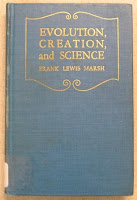The horse series and creationism
There are many topics that are "hot-buttons" for creationists. These are arguments that creationists get very passionate about (even though I'm not always certain why). If you've been involved in creationism at all, you could probably list a dozen or two. One such hot-button is horse evolution. It's been the subject of denial and derision for years, although creationist attitudes have softened recently . Creationist resistance continues however. I guess that such a popular example of evolution is just too tempting a target for many folks. I described my own interaction with the horses in an article for Answers , Horse fossils and the nature of science . In a nutshell, using baraminology techniques, I found (to my surprise) that all fossil equids appear to belong to a single baramin, and are thus descended from an ancestral pair of horses on the ark. To be blunter than I could be in Answers , the evolutionists got that one right, and we creationists appear...
